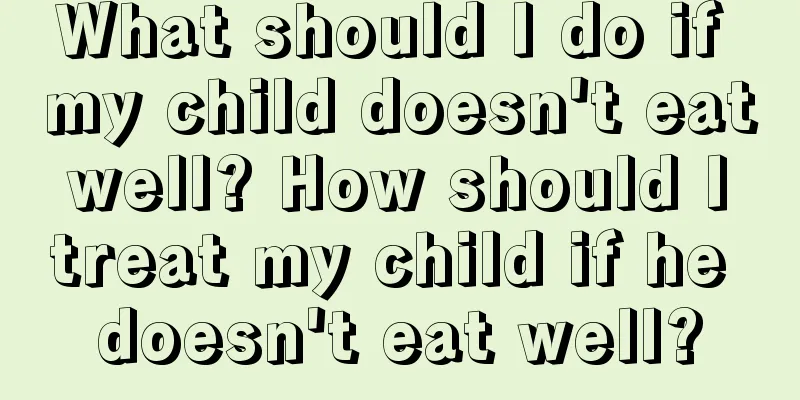What should I do if my child doesn't eat well? How should I treat my child if he doesn't eat well?

|
Children's feeding is a problem that worries many parents. Many children do not eat well, have irregular eating habits, and are naughty and active. It is recommended to adjust this situation by making foods that children like. What should I do if my child doesn't eat well?Before eating: 1. Prepare a set of special tableware for your child Adult bowls, chopsticks and forks are not suitable for children. Using large and heavy cups or bowls filled with juice or milk will make children feel pressured and affect their appetite. Sharp forks and easily broken tableware should not be used by children to avoid accidents. Children's tableware is more suitable for children. You can take your children with you to buy them and let them choose their favorite tableware to promote their interest in eating. 2. Notify your child to eat 10 minutes earlier If a child is having fun and is suddenly interrupted, he or she will inevitably feel angry, rebellious and rejecting. Therefore, even when facing a 2-year-old child, you should tell him or her in advance what is going to be done, and then give him or her buffer time to clean up the toys and prepare for the meal. 3. Eat less snacks Small and frequent meals are the most beneficial way for children to eat. However, the amount of snacks outside of meals should not be too large, so that children will not be able to eat at the meal time. And you should choose foods with high nutritional value as snacks, and avoid eating "junk" food. If you only eat a cup of yogurt and a bag of potato chips at 4 pm, will you still sit down and eat dinner at 5 pm? 4. Let your children help In order to satisfy children's desire to learn, mothers can ask their children to help before meals, such as tidying up the table, setting up the dishes and chopsticks, etc. In this way, children will be full of anticipation for meals, and the possibility of sitting down to eat obediently will increase. 5. Change your cooking method The reason why children cannot sit still while eating is not necessarily because the food tastes bad, but sometimes because the cooking method is unacceptable to the child. So you might as well change the cooking method frequently, such as steaming or braising, to give the baby a sense of freshness. In addition, most children like colorful food. If the food is made gray, it may be difficult to attract children to sit down and eat. In addition, children will not like food that is too cold or too hot. 6. Add more food that your child likes to your meals Although a balanced intake of all kinds of food can help children grow up healthily, you should not force your children to eat. You can start with the foods that children like to eat, and then gradually add other or new foods from a small amount to a large amount, so that children can accept all kinds of foods. In this way, you can discover more foods that children like to eat. As long as the diet is more varied, children will naturally be happy to sit down and eat peacefully. For example, if children like tofu and beans very much, you can often add some tofu or beans when trying new dishes, so that children are more likely to accept them. When eating: 1. Teach your children to use chopsticks Many children who cannot sit still while eating are fed by their parents, so after the child is three years old, parents can teach him to use chopsticks, learn to eat by himself, and it will be easier for him to sit still. Children under three years old should also learn to use a spoon to eat by themselves. If he can finish the meal by himself, he will feel a sense of success, and his interest in eating will gradually increase. Although the rice grains will be all over the table and his face and body will be a mess at the beginning, it is a necessary start. 2. Don’t scold your children at the dinner table The atmosphere should be relaxed during mealtimes, so that the child can feel comfortable. Don't try every possible means, or even make a big fuss, to get him to eat more. Don't always rush to ask, "Do you want to eat more?" If the baby says, "I'm full," parents should stop forcing him to eat. In this way, he can slowly understand what it means to be full. He won't run away after just a few bites of food. 3. Make your child feel hungry Sometimes the reason why children don't sit down and eat is because they are not hungry. So, we need to find a way to make them feel hungry. When the child eats a few bites and runs away, parents can calmly say "Okay, the child is full", and then take away the bowl, and don't care how much he has left. After a few times, the child will know that if he doesn't sit down and eat, he will be hungry. This method sounds simple, but it is not easy to do, because parents must first harden their hearts and can't always worry about the child being hungry and give him snacks, which will be counterproductive. Praise your child more after eating. When your child can sit still and eat, don't forget to praise him. Or after eating, parents can play with him for a while as a reward, so that he can have a happy memory of eating, and he will not reject eating in the future. Parents should also consciously instill in their children the idea that "eating well will make you grow faster and smarter". How to deal with children who don't eatMany parents complain that their children do not like to eat and that it takes a lot of time to feed them. At this time, parents should be careful. The child’s diet has a lot to do with the guidance of the parents. Do not use coercive behavior to force the child to eat. The best way is to guide the child to develop good eating habits. [Sufficient sleep is necessary] At this time, I believe that parents will definitely feel strange, how can eating and sleeping be connected together. In fact, the baby's digestive tract activity is closely related to the function of his cerebral cortex. If the baby does not get enough sleep, it will inhibit the feeding center in the hypothalamus, thereby significantly reducing the peristalsis of digestive juices and gastrointestinal tract. Therefore, adequate sleep is a prerequisite for improving appetite. 【The method of eating regularly and quantitatively is wonderful】 Eating at a fixed time and place will form a conditioned reflex in the child. Whenever it is close to a meal, his digestive system will become active, producing a feeling of hunger, thus preparing for eating. [It is helpful to increase interest in eating by doing something different] Parents can frequently change the cooking methods of food to improve the color, aroma and taste of food, which can increase children's interest in eating and promote appetite. [Forced eating is counterproductive] Many parents think that their baby eats less, so they must force him to eat more. In fact, due to the influence of physiological, psychological and environmental factors, babies sometimes eat more and sometimes eat less. This is a very natural thing, and parents don't need to worry too much. If you force your child to eat, it will cause the baby to be disgusted, and over time he will develop anorexia. 【Appropriate activities are essential】 Outdoor activities can speed up metabolism and help digestion and absorption of food, but do not engage in strenuous activities within half an hour before eating. Scolding at the dinner table doesn’t work Studies have shown that when a person is angry, sad or anxious, the pyloric sphincter will contract radially, causing food to remain in the stomach, leading to a decrease in appetite and even gastritis. Scolding or beating children during meals will not only reduce their appetite, but also cause them to refuse to eat to show their resistance. [Pre-meal snacks, firmly opposed] Some children eat and drink a lot of high-calorie snacks, such as chocolate, candy, etc., or drink a lot of beverages between meals every day. This will not only make the sugar content in the blood too high, but also produce a feeling of fullness, and thus no feeling of hunger. Therefore, when it is time for dinner, he has no appetite at all, and afterwards he has to eat snacks to fill his hunger, thus forming a vicious circle. Happy Hunger Therapy1. Eat at regular times and places, have a regular life, and let your children eat by themselves. Babies aged 18 or 19 months should be able to serve themselves. They should eat at regular times and places, and stop eating after 20 to 30 minutes, whether they are being fed or eating by themselves. This time is enough to finish eating. 2. Do not give your child any food from the end of this meal to the next meal. What should we do if children get hungry before mealtime and keep crying for food? Parents should hold their breath and gently insist to distract their children. You can let children play with toys, do handicrafts, play games or draw pictures, etc., which are not related to eating. You can even take children out to play. Don't preach, these words are meaningless. The best way is to distract their attention. At this stage, they can only drink water, not juice, yogurt or other milk drinks. After a few times, the child will know that there is no energy supplement between the two meals. If I don't eat well this time, I will be hungry in the middle. Hunger is an uncomfortable stimulus. Make sure the child feels that hunger is happening to him. 3. During the training process, you must evaluate the behavior rather than the child’s character. During this process, foster parents, especially grandparents, should not tell children: "Who told you not to eat well? Then go hungry." Such words will make children rebellious. Sometimes they may not understand the meaning of every word in your words, but they can deeply understand your emotions and changes in feelings. We should not say that the food is out of stock or that it is too late, nor should we say "I will starve you to death" or "Go away, don't be next to me" and other emotional catharsis or scolding words to children. When you vent your emotions to them, what should they do if they are emotional? They may attack you and retaliate against you, but more often they will eat more poorly next time to show their resistance. So this is the reason why there are battles for food in many families, and this is the psychological change process behind it. 4. Parents should not be afraid of starving their children. It is not harmful for a child to go hungry for one or two meals, as long as he drinks water. I believe that the problem can be solved by going hungry for one or two meals in a row, rather than three meals. You need to learn to be gentle and persistent to distract him. Signs that children are not eating well1. Watch cartoons In most families, dinner time is when cartoon programs start. It is difficult for babies to resist this temptation, and they often rush to the living room after taking a bite. 2. Running around After being "bound" in kindergarten for a day, the child likes to run around when he returns home, sometimes just wandering around aimlessly. Eating? He doesn't even take a look at the food even though it's cold. 3. Play with toys At some point in time, a child may be particularly fascinated by a certain toy, such as Ultraman or Tank Man. He cannot take the toy to kindergarten, so he will play with it after returning home and refuse to let go even when eating. |
<<: What are the benefits of parent-child games?
Recommend
Can I eat glutinous rice balls during the confinement period? Precautions for pregnant women to eat glutinous rice balls
Tangyuan is a very traditional snack in our count...
Does children's vomiting mean they have the flu? Does children's flu cause vomiting?
Many parents know that their children are prone t...
How often should a baby take a bath in autumn? How often should a baby take a bath in autumn?
How often should babies take a bath in autumn? To...
What are the disadvantages of children going out at night? The real reason why they can't go out at night
We often hear people, especially the elderly, say...
How to choose a two-character name for a boy with the surname Yu? Recommended two-character names for boys with the surname Yu
For many people, naming is a difficult task. Chin...
Which country is Calcite from? Where is Calcite produced?
Many people's understanding of Calcium comes ...
Is it better to use round or flat dental floss? The correct way to use dental floss
Dental floss also comes in many styles. So when b...
What is the best food to eat when preparing for pregnancy?
Nowadays, many women have plans to prepare for pr...
Advantages and disadvantages of American IVF How much does American IVF cost
Because the success rate of IVF in the United Sta...
How to store milk powder after mixing it? Misunderstandings about milk powder mixing
Milk powder is a drink that everyone likes. It ha...
Why can't the milk powder for pregnant women be dissolved? There is sediment after the milk powder for pregnant women is dissolved
Drinking milk powder for pregnant women during pr...
9-year-old boy's schedule: study 18 hours a day
Recently, a news report reported the daily schedu...
What is the cause of milk blockage? There may be several reasons
New mothers are prone to milk duct blockage in th...
What material is good for a mommy bag? 4 common materials comparison
First, canvas is economical and practical, but it...
Can newborns have their nails cut? What should I do if my newborn's nails are cut on the flesh?
Cutting nails is a very common thing. We all know...









